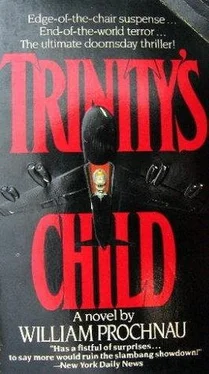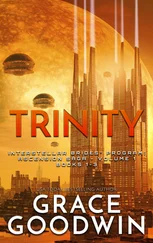“We don’t have time for apple pie, sir. In any normal sense, we are the wronged party tonight. This is not a normal night.” He paused. “No finer nation has ever been conceived on this earth. We have tried to correct wrongs within our own borders. We have tried, with less success—and often using our own standards—to correct them outside our borders. I believe we, like few nations, have tried to do our best by the world.” He paused again, and swept his eyes around a quietly vibrating compartment in which all other eyes were cast downward except those of the successor and the colonel. “No nation is always right. We’ve made mistakes, yes. Our largest was the relentless accumulation of the weapons we are now using. There will be no winners tonight, sir. But perhaps, just perhaps, we can find the wisdom to salvage a touch of the humanitarianism of which our country has been so justly proud.”
Harpoon stopped, somewhat embarrassed, and there was silence in the compartment. He stared at the successor without challenge and the man stared back with curiosity. Mistakes. God forgive them, they had made so many. God forgive him, he had participated in so many.
“So you want me to be remembered as an umbrella-totin’ Chamberlain, buying peace at any price?”
Harpoon felt helpless. After all the combativeness of the briefing, he once again felt empathy for the unprepared human being in front of him. Perhaps he was asking too much, asking him to break out of a lifelong mind mold in mere minutes. In the seventies he had spent several months at the War College in Washington. One of the lecturers was a stooped old professor of philosophy from a liberal Ivy League college. One of Rickover’s perverse tests, he and his officer colleagues had concluded. The professor had pushed them about the tree in the wilderness and they had perfunctorily debated whether it made a sound, missing his point. On his final day, the old man told them they were all left-siders, playing chess and war. Right-siders play different games and survive. In his final message—and Harpoon recalled each word now—the man said without enmity: “This generation of men may be the most shortsighted in history. It not only consumes the earth’s resources, robbing the future of its heritage, it also toys childlike with a power that could rob the past of its existence. Chess is a simple game, gentlemen.” Only now did Harpoon realize that the tree was the earth.
“No, sir,” Harpoon said, “I want you to be remembered.”
The successor looked at him without understanding.
“I don’t like you, Harpoon.”
“I know that, sir. I’m sorry, but it’s not important.”
“Didn’t say I didn’t respect you.”
Harpoon was surprised, but he said nothing.
“We’re down to it, aren’t we?”
“Yes, sir. We have about thirty minutes.”
“And now you’re going to ask me to surrender. Can’t do that, you know.”
Harpoon looked at him with both consternation and compassion. “Surrender, sir? No. I want you to try—simply try—to use the pause. Try to turn this thing off till we can talk to the Soviets, talk to our submarines.”
“Talk to the Soviets.” The successor shook his head slowly at the thought, and his drawl disappeared immediately. “Dammit, Harpoon, we have been trying to talk to the Soviets for fifty years, and what good’s it done us? Hell’s bells, mister, we couldn’t even talk to them during the Second World War. And they were on our side then. How the devil am I supposed to talk to them? You say I can’t even talk to Minneapolis.”
“You can’t talk to them now, sir. You may be able to in four or five hours if we don’t blow the ionosphere to smithereens again and suck the guts out of our radios and computers.”
“Harpoon, you amaze me. Downright amaze me. You just said I got thirty minutes.”
“To talk to our bombers. Before they go down to low-level and the best communications system in the world couldn’t get through to them.”
Harpoon paused once more. He felt the beads of sweat pop on his forehead. The map’s blue ovals pulsated at him mockingly. Behind the successor the arms of the Zulu clock formed a haunting smile, the second hand relentlessly sweeping onward. He scanned the faces of his colleagues. All knew what was coming, but none, except the colonel, met his eyes. The colonel stared back in a mix of challenge and curiosity. Harpoon stared at his rival. My God, was this a chess game too? The colonel smiled. It was; now or never. He drew his eyes away and riveted them on the successor, whose blank face seemed to miss the import of the moment.
“Bring them back, sir,” Harpoon said simply.
The words seemed to carom off the fluxing computer maps and echo in the sudden silence of the briefing compartment.
“Bring the bombers back,” Harpoon repeated quietly, trying to keep the pleading out of his voice.
The successor stared at Harpoon, briefly bewildered. Then his face slowly broke into a thin smile. “Now, that’s a real good plan, Harpoon,” he said, his voice cutting with sarcasm. “You want me to call up the Soviet bombers and send them home too?”
“If we’re lucky, very lucky,” Harpoon replied slowly, “the Soviets will do that themselves. If someone is in control over there. If they can see us. There are many ifs.”
“Yes, mister, there damned well are. And the biggest if is if I feel like surrendering. Which I don’t.”
“Surrender?” Harpoon asked, his voice even despite his despair. “How in God’s name is that surrender? You still have your submarines. Sixty percent of our strategic weapons are in those boats. Seven thousand city-killing warheads. Maybe, just maybe, bringing back the bombers would get us a truce.”
“Now it’s a truce. That’s a damned fancy word for surrender. Those uncivilized bastards started this and kicked the pucky out of us, Harpoon. We kicked them back. A relatively even exchange. Except there’s ten million more Americans dead. Except we had a damned sight more to lose than those barbarians did. They just brought the United States of America down to their level, Harpoon. Now they’ll just go out there and rebuild from the same point as us.” The drawl crept back, as if for emphasis. “That means losin’, dang you. And quittin’ means surrenderin’.”
“Good God, sir. Nobody’s going to rebuild without outside help. Who would you rather be, us or them? Would you like to ask Poland for aid? Czechoslovakia? Hungary? Afghanistan?”
The successor looked around the table. The colonel still rolled his eyes. The others looked at him in solemn anticipation. He turned back toward Harpoon.
“Rebuildin’ isn’t the point anyway,” he said. “You tell me we only have twenty bombers left and maybe only a couple will get in. They got a hundred and fifty coming at us, soon to be roaming at will over our country, you say, because we haven’t got any consarned peashooters. You’re the military man. Would you make that trade?”
Harpoon sensed his last chance. “The bombers aren’t the point either,” he said. “Even a couple could take care of Leningrad and what’s left of Moscow, plus odds and ends. The subs are the point. They know we’ve got them. They know we’ll use them. You’re the politician. Would you take a chance to make that trade, saving your country from total annihilation?”
“A damned Indian smoke signal,” the successor said angrily. “That’s what it is. Sounds like we’re back in the nineteenth century already.”
“We are, sir.”
“And that’s the Jericho decision? To call the bombers back and hope the Kremlin follows suit?”
“To use the pause in any way possible, sir, to settle things down.”
The successor slumped. He caressed the Seal, rubbing the lettering as if it were braille. “What lunatic designed this madness?” he asked disconsolately, the words directed at no one. “There’s no way to win.”
Читать дальше












